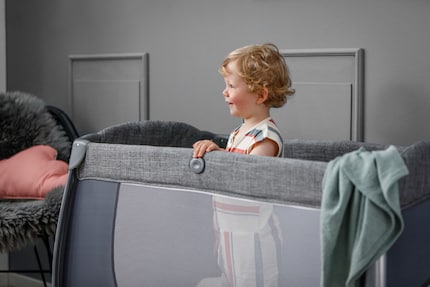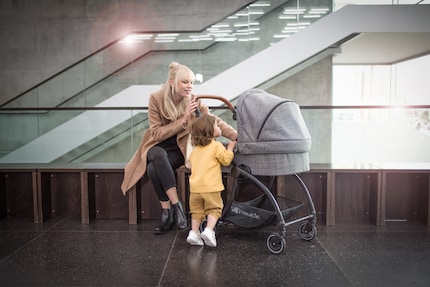
Guide
6 sleeping options for your child when you're at home
by Myrtha Brunner

In the first few weeks after the birth, your baby needs a lot of closeness, security and sleep. This makes it all the more important where and how you put it to bed. Not just at night, but also during the day. Here are four ways to put your child to sleep while travelling.
Your baby needs closeness, security and sleep to develop well in the first few months of life. Especially in the first few weeks, a baby sleeps an average of 16 to 18 hours. It's hard to imagine that you'll always be at home during this time. But what sleeping options are there for travelling?
Perfect for holidays, when you're visiting friends or when your child is staying somewhere else. It also serves as a playpen or small play area. Hotels often provide you with a baby cot or travel cot. However, it's better to ask the hotel before you go on holiday. This will save you the hassle of transport.
A travel cot can be assembled and disassembled quickly and gives your child a familiar nest despite the unfamiliar surroundings. Almost all travel cots are foldable, but they differ in the accessories they come with (mobile, mosquito net, travel cot cover, changing mat, toy bags, etc.). Some include wheels or an extra exit.

A child car seat is ideal for short naps in or outside the car. It is not suitable for long naps or continuous use due to the seated position and lack of freedom of movement. Although the little ones nod off quickly while travelling in the car, the child should not sleep in the car seat for long periods of time.
Babies can be transported in a carrycot until they are around six months old or until they can sit up independently. The horizontal lying surface means they sleep comfortably and have enough freedom of movement to exercise their muscles. Whether in a restaurant, in the shopping centre or on a train journey, your child will sleep comfortably anywhere. And if there is no changing table available, you can use the lying surface of the pushchair for this purpose.
With sports seats or buggies, you can usually lower or even level the lying surface for sleeping. Make sure you secure your child, as the pushchairs do not have side walls in this form.

Some babies need close physical contact to fall asleep, even when travelling. This helps them to calm down more quickly and feel more comfortable. In this case, a baby carrier or sling makes more sense than a pram. However, bear in mind that your child's body temperature is around 37 degrees. Therefore, don't dress it too warm so that it doesn't overheat.
The big advantage is that you can adapt flexibly to the environment with a carrier. Pavements, stairs or train doors are no obstacle and your hands are free despite carrying your child. You can also do the shopping and household chores with ease. If you like to lay your child down in between, take the pushchair with you as well as the carrier.
To all baby carriers | To all slings
Are you looking for a sleeping option for your own four walls? Then read this article:
I’m the cook, cleaner, police officer, nurse, entertainer, motivator, author, storyteller, coach, organiser, chauffeur, lawyer and judge. To put it simply, I’m a mum to a daughter and not just a (Content) Manager at the office but also at home.
Practical solutions for everyday problems with technology, household hacks and much more.
Show all